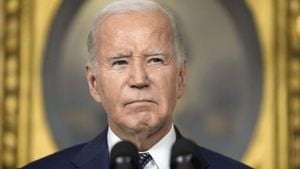Quebec is undergoing significant political and social reform initiatives as it grapples with issues ranging from reproductive rights to autonomy and governance. The recent push for free access to contraception has caused quite the stir, gathering nearly 100,000 signatures on a petition spearheaded by Québec solidaire spokesperson Ruba Ghazal. Her petition symbolizes the broader movement for women's rights, intersecting with the political narratives around gender equality and accessibility to healthcare.
The catalyst for this mobilization? The election of Donald Trump, which left many Quebec residents motivated to take action to preserve women's rights—rights they viewed as potentially vulnerable. Ghazal remarked, "With the election of Donald Trump and the setbacks for women’s rights in the United States, many Quebec women, but also Quebec men, wanted to mobilize," highlighting the influence of U.S. politics on Canadian societal attitudes. The petition aims to address the cost barrier associated with contraceptives, which forms the crux of the issue. Ghazal asserts, "Studies prove the most significant barrier for women to use contraception is the cost...making it free will protect them against being pregnant if it wasn’t their choice."
The current Legault government must respond to the petition, with the deadline looming at the end of January. This anticipated response is part of the political dance occurring within the National Assembly, amid rising discussions around women's healthcare accessibility. Ghazal has termed accessible contraception as “a zero-cost prevention measure,” arguing it can alleviate the financial burden on women, especially during the pressing cost-of-living crisis. This argument resonates particularly with the fact 40 percent of pregnancies are unplanned, leading to increased pressures on healthcare services.
Meanwhile, on another front, the conversation around Quebec's position within Canada is also heating up. Premier François Legault has expressed his openness to the idea of adopting Quebec's own constitution before the next provincial election set for October 2026, following recommendations from a government-appointed committee. This report aims to bolster the province's autonomy and is viewed by some as Legault's attempt to solidify his base amid declining poll numbers against the more nationalist Parti Québécois.
One of the recommendations suggests modernizing Quebec’s laws to eliminate references to the monarchy. This shift is not merely symbolic; it aligns with the current sentiments surrounding Quebec's identity and its desires for increased sovereignty within Canada. Justice Minister Simon Jolin-Barrette has advocated for caution, emphasizing the need for thorough review of the 42 recommendations before any major steps are taken, especially since some recommendations may require negotiations with the federal government.
The debate continues over how many of these recommendations might garner support within the CAQ government and its impending relationship with Ottawa. From appointing judges based on provincial recommendations to negotiating housing proportions for asylum seekers, the stakes are high, and the pathways unclear. Previous interactions between Legault’s administration and Prime Minister Justin Trudeau have not always been straightforward, with Trudeau labeling the constitution discussions as politically motivated.
On the streets of Quebec, community sentiments are also shifting. A campaign is gaining traction, spearheaded by l'Observatoire pour la justice migrante, which seeks to challenge narratives around immigration within the province. Hip-hop artist Aly Ndiaye, known as Webster, is among those featured prominently, amplifying voices advocating for immigrant rights and addressing public perceptions often skewed by political discourse.
This convergence of social and political issues reflects the current climate in Quebec, characterized by heightened activism and advocacy for change. It's not just about reproductive rights or the drafting of a constitution; it’s about redefining Quebec's identity within the larger Canadian federation and ensuring the voices of its diverse population are heard and respected.
Quebec seems poised for transformational changes across multiple fronts. The success of Ghazal’s petition could lead to significant shifts in women’s rights and healthcare services, providing free contraception as standard practice. Simultaneously, the proposed constitutional reforms offer Quebec the opportunity to redefine who it is and how it wants to interact with the rest of Canada.
If passed, these reforms could set the tone for true representation of Quebecers' needs and aspirations. Whether it will culminate as one of the most significant political milestones for Quebec remains to be seen. But one thing is clear—Quebecers are ready to voice their demands, whether it's at the health care desk or the legislative chamber, and the political leaders must now navigate this growing tide of activism and expectation.



